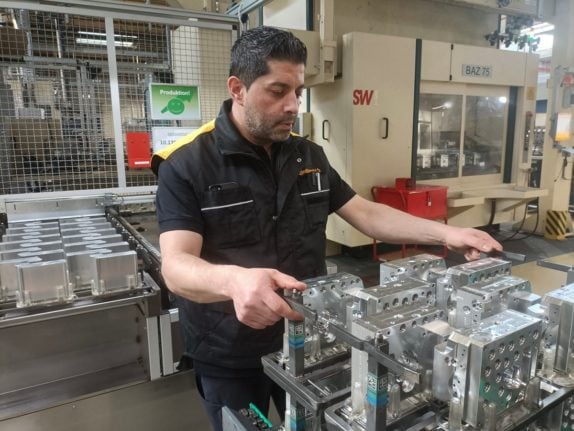Production of the car component at the town of Gifhorn will end in 2027 and move to Croatia, the Czech Republic and Wales to keep the costs “competitive”, according to Continental, which will cut about 7,000 jobs worldwide.
The relocation means a new career for 49-year-old Karaca, one of a rising number of workers in companies supplying Germany’s vital automotive sector who are being hit by a tsunami of redundancies.
Facing up to the double shock of the end of combustion engines and rising competition from China, European suppliers like Bosch, ZF and Webasto have all announced cuts — which have piled up to the point where the issue has cast a shadow on the forthcoming EU elections.
Brussels has promised to do more to boost the domestic car industry and tackle unfair competition from cheaper Asian rivals.
But EU plans to outlaw the sale of new fossil fuel-powered cars from 2035, meaning some jobs will inevitably become redundant.
Battery transition
The upcoming closure to the Continental plant in Gifhorn has been the catalyst for Karaca and the other 800 employees working there to start retraining in another area.
A local heating systems company, Stiebel Eltron, has proposed to take over the site and retain some employees for future production.
“Brakes or heat pumps, it’s all the same to me,” said Karaca, whose two parents both worked for Continental at the factory.
Making exhausts, headlights, gear boxes or brakes has long been a steady job with suppliers in Germany alone employing some 270,000 people.
But the technologies they have specialised in are obsolescent and the process of making battery cars is a less labour-intensive undertaking.
“If today you need 100 people to produce a normal motor, then with the electric motor you only need 10,” said Jutta Rump, a business professor at Ludwigshafen University.
In Gifhorn, Stiebel Eltron is offering the prospect of further employment to some 300 of Continental’s workforce.
Another 100 could find a home at a nearby Siemens mobility plant that supplies rail companies.
Poor prospects
What jobs remain are under increasing pressure from Chinese competitors, who are hauling in a growing share of the market.
The Chinese battery-maker CATL has grown in short order to become the world’s third largest auto supplier, in a sector still led by Bosch, according to consultancy Roland Berger.
In Germany, one in three companies in the sector is planning to move part of its production abroad in the coming years to cut costs, according to a study by the German carmakers association VDA.
The axe has already fallen on 3,400 workers at Ford’s factory in Saarlouis, in the west of Germany.
The plant closure takes with it a whole network of local suppliers, whose workers staged a six-day strike in March to get better redundancy terms.
Among them, 33-year-old Luca Thonet, employed by Ford supplier Lear, said he would like to stay in the region, close to the French border.
“But there is almost no industry left in the region, and the other factories are not in a very good situation either,” he told AFP.
Thonet cited the situation at ZF, the second-largest German auto supplier, which announced the closure of two sites in its domestic market.
The ZF works council fears some 12,000 job cuts could be in the pipeline, with a number falling in the same region as Saarlouis.
Germany may be facing a shortage of workers, but not all sectors are equally impacted.
In IT, product development, or sales “there’s a lack of qualified personnel”, said expert Rump. “That’s not the case in production.”
By Lea PERNELLE




 Please whitelist us to continue reading.
Please whitelist us to continue reading.
Member comments